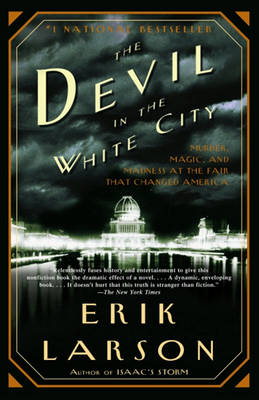
The Chicago World's Fair of 1893 and its amazing 'White City' was one of the most spectacular the world has ever seen. This is the incredible story of its realization, and of the two men whose fates it linked, an architect and a serial killer.
The architect was Daniel H. Burnham, the chief builder of the White City, who created a magical landscape of white buildings set in a wonderland of canals and gardens. The killer was H. H. Holmes, a handsome young doctor with striking blue eyes. He used the attraction of the great fair - and his own devilish charms - to lure scores of young women to their death. Holmes would stroll through the fair at night, when an electric dynamo transformed it into an incandescent fairyland, with his unsuspecting victims on either arm. While Burnham overcame politics, personality clashes and the fatal Chicago winds to bring together the creative talents of his architectural team in the transformation of swampy Jackson Park into the White City, Holmes was busy constructing his own edifice just west of the fairgrounds. He called it the World's Fair Hotel and designed it to be a torture palace, complete with gas chamber and crematorium.
Burnham, Holmes, and a colourful cast leap off the page of this magnificent story, as Buffalo Bill, George Ferris, Thomas Edison, and some 27 million others converge on the dazzling spectacle of the White City. Erik Larson's gifts as a story-teller are magnificently displayed in this mesmerizing tale of the legendary Fair that captured the spirit of America at the dawn of the Twentieth Century.
- ISBN10 1299102980
- ISBN13 9781299102989
- Publish Date 1 January 2004 (first published 11 February 2003)
- Publish Status Active
- Out of Print 8 April 2015
- Publish Country US
- Imprint Vintage
- Format eBook
- Language English
Reviews


readingwithwrin
This book wasn’t exactly what I expected it to be and that why it took me almost a month to read. Having said that though I did really enjoy it and I liked learning so much about the Chicago Worlds Fair, I just wish more had been focused on H.H Holmes.
I knew some about the worlds fair, and the things we got out of it that are still around today, but I didn’t know how much really went into making it and how it was a rush at times.
Larson did make it interesting to learn so much, but I do think at least for me that it’s one that had to be read slowly.

gmcgregor
I was super looking forward to this when I started it: with the huge amount of praise it got, and how much I enjoyed Larson's most recent Dead Wake, it seemed like it was going to easily be a new favorite. But I just didn't get really into it the way I was hoping. Which doesn't mean it wasn't good! It was, quite good in fact. But Larson's threading together of the different stories wasn't quite as skilled as it was in Dead Wake. Since I was in the middle of being stressed out about planning my own event as I was reading it (less than a month before my wedding), the long recounting of the delays and problems of planning and building the Fair just gave me anxiety. But I think even without my personal baggage, I would have found this portion of the book a little overlong. I get what Larson's trying to do: you know it did come together and was successful in the end (he tells you that much right from the beginning), and as he recounts mishap after mishap, it's supposed to keep you hooked and wonder how in the world it got pulled off. But at a certain point I just wanted to the Fair to start already because I knew it was going to and I was tired of hearing about how it almost didn't.
The part of the story about the Fair is so dominant that the part about the serial killer (which was honestly the part I was most interested in) gets a little bit of the short shrift. Holmes and his story kind of lurk around the outside edges, which I suppose is appropriate since lurking around the edges of the Fair is exactly what Holmes did in real life. But every time the book turned back to the Fair from Holmes I groaned a little inside, because I found the latter so much more compelling. The book effectively ends by devoting itself to wrapping up Holmes' plotline, and it was the first time I felt reluctant to put the book down since I started it. On the whole the book is well-written, interesting, and definitely worth a read, but don't go in expecting it to be mostly about one of America's first serial killers or you might be a little disappointed.

Liz (Bent Bookworm)

Terri M. LeBlanc

ibeforem
But Holmes isn’t the real star of this book, and that was the biggest surprise. I ended up being much more enthralled by the story of the World’s Fair than in Holmes story. The book follows the fair from it’s earliest planning stages to the bitter end. It’s really amazing the things that became popular because of this fair. It was a big reason why Tesla’s A.C. won out over Edison’s D.C.. The Ferris Wheel was invented. The largest buildings of the time were built. It’s when the term "midway" was coined. Food products like Cracker Jack, Juicy Fruit, and Shredded Wheat were introduced. And there was so much more; it really was an amazing event for the country.
Unfortunately, because the book is straight non-fiction, rather than creative non-fiction, it can get a little dry in places. There’s really only so many times you need to tell me that the landscape designer (who, by the way, also designed Central Park and the grounds of the Biltmore), was extremely particular. Beyond that, I found it to be a very interesting piece of history.

Eve1972

empressbrooke
Although I imagine I appreciated the book more than someone who hasn't lived in Chicago, familiarity with the city is definitely not required. The Chicago of the 1880s is not the Chicago I know, and Larson does an excellent job putting things into perspective so that modern readers understand why certain things mattered or were different back then.
Larson's research is meticulous; anything that is in quotation marks is a direct quote from a primary source. Thus, the quotations serve less as dialogue, and more as support and evidence for the rest of the text. Larson doesn't litter the pages with footnotes and citations, but does include his works cited information in the back in a way that makes it easy to follow up on certain topics that might raise the reader's interest. I found it helpful to read the end notes, where the author explains how he decided to portray Holmes, before reading anything else.
If you like history or "the truth is stranger than fiction" stories, Devil is a great book, and one that doesn't take too much time to read.
